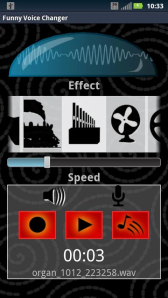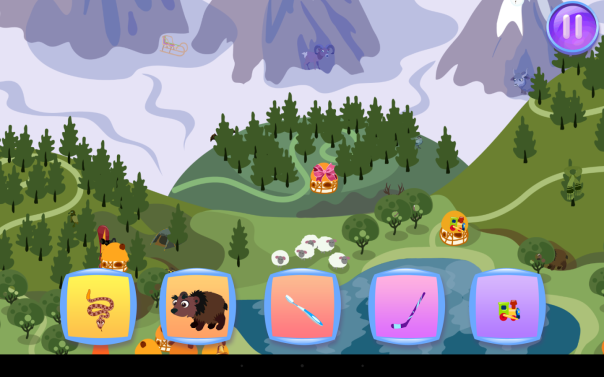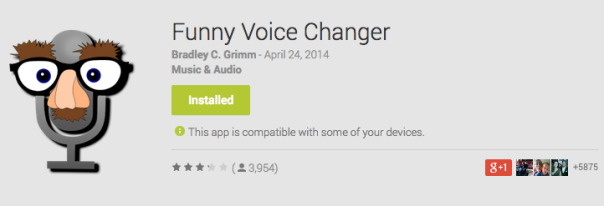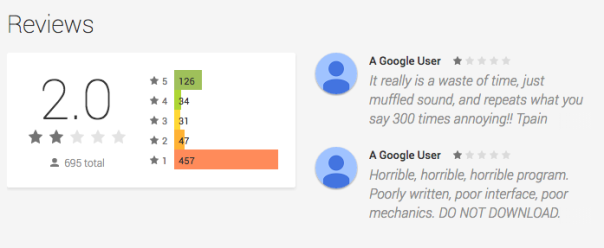Both the Google Play Store and the Apple App Store were built on the backs of independent developers. The platform was wonderful! People could easily find exactly the apps they were looking for, and developers could finally reach out to niche markets. The pay for developers was reasonable, and the cost for users was much cheaper than traditional software. Life was great.
But not anymore. Let me share a couple experiences…
 Over two years ago I released my second app to the Play Store, Funny Voice Changer. My first app, Palette Painter, had a really slow launch, after all it only supported Android 3.0 on launch day which had less than 1% of the market (though it supports 2.2+ now, and is still going strong). I expected the same slow response with Funny Voice Changer, so I clicked Publish and went on vacation. Boy was I wrong.
Over two years ago I released my second app to the Play Store, Funny Voice Changer. My first app, Palette Painter, had a really slow launch, after all it only supported Android 3.0 on launch day which had less than 1% of the market (though it supports 2.2+ now, and is still going strong). I expected the same slow response with Funny Voice Changer, so I clicked Publish and went on vacation. Boy was I wrong.
Funny Voice Changer exploded overnight. It was getting thousands of downloads a day. In fact, it was too many. I wasn’t ready for the barrage of ratings, the bugs it encountered, and the emotional roller coaster that ensued. I gave up on the app after just a couple of months, something I have regretted ever since.
 I have since learned about the importance of iteration, and finally decided to fix those two apps, and remove that regret from my shoulders. Yesterday, I finally released the refreshed versions, Funny Voice Changer 2.0 and Scary Voice Changer 2.0.
I have since learned about the importance of iteration, and finally decided to fix those two apps, and remove that regret from my shoulders. Yesterday, I finally released the refreshed versions, Funny Voice Changer 2.0 and Scary Voice Changer 2.0.
So how is the launch going so far? Try a little experiment for me, go to the play store and search for Funny Voice Changer or better yet, use the name exactly Funny Voice Changer 2.0. Do you see it? If you don’t, that’s because it is ranked #124 for the first, and #88 for the second. That’s right you can’t even find your own apps by name anymore. Note: You will see my Voice Changers from 2.5 years ago in the 1st and 4th places. You won’t find my new voice changers.
You can’t even find your own apps by name anymore.
Perhaps this is a one time thing? (Well two technically, since there are two voice changers) But the same thing happened to me just a couple weeks ago. I released a fun Hidden Animals game. My son loves it, and I’m certain other kids would as well. But the day of the launch I couldn’t find it. Even searching by the exact name it didn’t show up at all, not in any page, in any search I tried. I have since tweaked the name and description a bit and have gotten it to show up at about the same 100th place on the search, but not exactly a searchable spot.
So how are they ranking apps via search? Nobody knows. Which is probably for the best, otherwise people would game the system. It is obvious that the title and description don’t help as much as they once did. So perhaps there is a variety of good reasons they’ve done so, right? After all,the goal is to provide people with the best apps possible. So what factors could they be using to rank apps?
Here are a few ideas along with some comments:
- Ratings. This actually seems like a fairly reasonable way to organize apps. But I have my doubts that it actually has much of an effect. After all my previous Funny Voice Changer is ranked #1 and it has a miserable 3.3 star rating. But worse, even some 1-star apps are showing up higher than my new apps, and these are apps that people obviously don’t want.
- True intent. A user types in “Funny Voice Changer”, but is really interested in any voice recorder out there. This has a grain of salt to it, we don’t always know exactly what we are looking for. Though I believe people are generally pretty good at it… but if they are looking for a funny voice changer it doesn’t make much sense to show a face changer. That having been said, there are a *lot* of voice changers, so I do applaud Google for trying to parse it into something reasonable (assuming the results are reasonable).
- Number downloads. Once again it makes sense that if an app is downloaded a lot it must be loved. Though I do argue this should be weighted by how well people *liked* the app after they downloaded it. For instance, even though this app has 100,000 - 500,000 downloads, something tells me that if you download it, you won’t like it. This method of course helps either apps that have been in the store for a long time (regardless of worth), and developers with large pockets who can advertise to get a lot of downloads quickly.
- App awesomeness. I think this is a great metric, but how do you calculate this? The only way I can think would be how pleasing the screenshots, title, description, ect are. I would love to believe that they’re doing crunching on these to calculate an awesome score, but seeing apps like this and this make me believe they aren’t.
- App life - I’ve heard some people say that uninstalls have a huge impact on your ranking. That makes a fair bit of sense, and I hope it is something they are doing. On the other side of things, not all lifecycles are the same. While some apps like Facebook you may keep on for the long haul, there are apps that may be perfect for an occasion. Mine are great for sleepovers, others are great for weddings, and others for travel. But you still should be able to find those apps if you’re in the moment.
- External links/Google magic. This seems the most reasonable idea. But it also tends to benefit those with large pockets. Do you want lots of reviews of your app? Do you want press releases? Then open up your checkbook, because nothing is free. And that’s assuming your SEO efforts even pay off, it is very likely they won’t.
I don’t know how their ranking algorithm works. But it is clear to me that as an indie developer it is no longer worth it to invest my time into building creative apps for the Play Store.
I’d love to hear your experiences on deploying to the store. Has it been the same for you?


